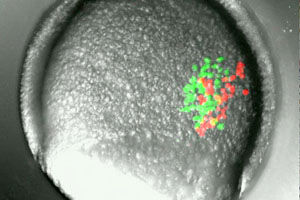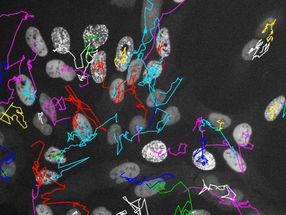Cancer stem cells recruit normal stem cells to fuel ovarian cancer, U-M study finds
Researchers also find protein that blocks this effect, suggesting potential therapy
Researchers at the University of Michigan Comprehensive cancer Center have found that a type of normal stem cell fuels ovarian cancer by encouraging cancer stem cells to grow.
Cancer stem cells are the small number of cells in a tumor that drive its growth and spread. Traditional cancer treatments do not kill these cells, which is why cancer treatments often fail.
In a study published online in the Journal of Clinical Investigation, researchers looked in ovarian tissue at the mesenchymal stem cells, which are normal cells found throughout the body. These cells can form different specialized cells such as fat, bone or cartilage.
Mesenchymal stem cells are known to be helpful with wound healing, which has many scientists conjecturing that they may help combat cancer. In this study, the researchers observed that mesenchymal stem cells in ovarian tumors were different than mesenchymal stem cells from healthy ovaries. And in fact, the mesenchymal stem cells in the ovarian tumors were fueling the cancer.
“Cancer is very good at tricking the mesenchymal stem cells into doing what the cancer likes. The cancer takes the cells hostage and uses them to promote the cancer’s growth,” says study author Ronald Buckanovich, M.D., Ph.D., assistant professor of internal medicine and of obstetrics and gynecology at the U-M Medical School.
The researchers used mouse models and human tissue samples of both normal ovaries and ovarian cancer, to look at what happened to the mesenchymal stem cells. They also noticed the cancer-associated mesenchymal stem cells increased the tumor size, primarily by increasing the number of cancer stem cells.
At the same time, the researchers saw that a type of protein called BMP2 was prevalent in the cancer-associated mesenchymal stem cells. BMP2 is a master regulatory protein. The researchers found more than three times the amount of BMP in the cancer-associated mesenchymal stem cells than in the normal ones. When BMP was added to cancer cells, it led to an increase in cancer stem cells.
The researchers then used a known BMP inhibitor called Noggin, and found that Noggin blocked the mesenchymal stem cells from triggering this cancer stem cell growth.
“High doses of Noggin might not be tolerated in humans,” Buckanovich says. “Our next step is to figure out how to target Noggin directly to the vascular niche where the mesenchymal stem cells and cancer stem cells live. This would allow us to make it safer and more potent to use Noggin as a potential treatment for ovarian cancer.”
This research must continue in the laboratory before it can be advanced to clinical trials. In the meantime, the U-M Comprehensive Cancer Center expects to open two new clinical trials within the next year testing other therapies aimed at attacking ovarian cancer stem cells.
Most read news
Organizations
Other news from the department science

Get the life science industry in your inbox
By submitting this form you agree that LUMITOS AG will send you the newsletter(s) selected above by email. Your data will not be passed on to third parties. Your data will be stored and processed in accordance with our data protection regulations. LUMITOS may contact you by email for the purpose of advertising or market and opinion surveys. You can revoke your consent at any time without giving reasons to LUMITOS AG, Ernst-Augustin-Str. 2, 12489 Berlin, Germany or by e-mail at revoke@lumitos.com with effect for the future. In addition, each email contains a link to unsubscribe from the corresponding newsletter.

























































